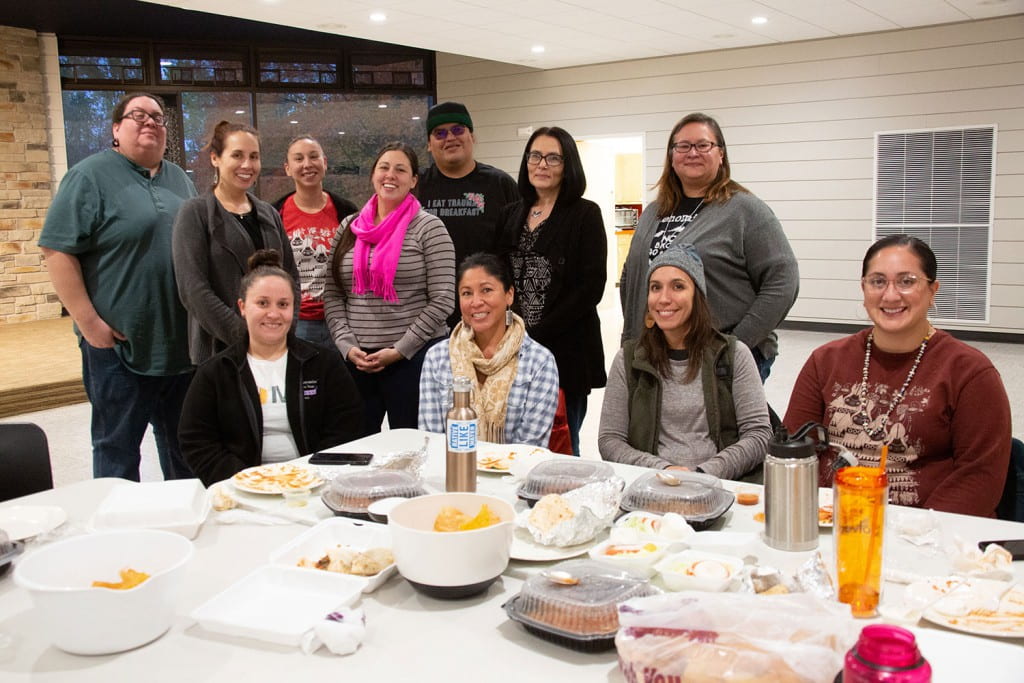Community of Learners Developing leaders in First Nations Education

Transformative. Intense. Rigorous.
These are the words students use to describe UW-Green Bay’s first-ever doctoral program—the only one of its kind in the state of Wisconsin—the Doctorate Degree in Education (Ed.D.) in First Nations Education. The four-year program enrolled its first cohort of 12 students in the fall of 2018.
This is exactly what UW-Green Bay Associate Professor and Program Director Lisa Poupart, Ph.D. had in mind as she and her colleagues developed the program. Born out of feedback from First Nations communities throughout the state, leaders asked for a very specific, rigorous program that would balance relational, face-to-face learning with concrete, usable outcomes requiring graduates to further promote cultural insurgence and the vitality of future generations.
“There’s a rigor to the program,” says Poupart. “The listening sessions provided this feedback—they want graduates who understand difficult concepts and can talk about them and write grants, etc. We are telling the students that their communities set a high standard, and we are going to hit those marks.”
Building Community
The Ed.D. in First Nations Education program is centered in indigenous knowledge systems and draws upon indigenous teaching and learning methods from elders and oral scholars, as well as faculty expertise. Classes consist of a set of core courses offered primarily in face-to-face settings, reflecting the strong commitment to the oral tradition rooted in First Nations culture. UW-Green Bay was a natural fit to host the first-of-its-kind doctoral program because of its 20-year history of teaching First Nations education at the University, and its tribal Elders in Residence program.

The Ed.D. in First Nations cohort of learners gathers for a meal following a Saturday class.
The inaugural cohort of 12 began its second fall term in 2019. According to Poupart, the cohort model accurately reflects indigenous teaching and learning, and reflects a true community. “We’ve built something within a community, and the group learns with and supports one another. To have these experiences together is really central to their success in the program.”
Bawaajigekwe Andrea DeBungie, a current student in the cohort, describes her 14 months within the program as transformative. DeBungie is a special education teacher in Ashland, Wisconsin and the recipient of the 2020 Special Services Teacher of the Year in Wisconsin. “The program is very different than anything I have ever experienced, as a teacher or anything,” says DeBungie. “The experiences have helped shape and reshape how I function as an educator, mother, human being.”
The group clearly considers itself a family of support for each other. “There is such encouragement and support within the cohort, and that 100% includes the instructors,” says DeBungie. “I would not be able to do this program otherwise. We all agreed and had conversations about this. We are stronger together.”
Transferring Knowledge
Her experiences have already had an impact in her classroom, specifically as it relates to what she calls the four R’s – relationships, respect, reciprocity and responsibility. “(The program) focuses on relationships, and all students benefit from teachers who invest into them. It has helped me become more intentional as an educator,” says DeBungie, “and work to shift the power dynamic in the classroom from one expert to a community of reciprocal learners and reciprocal relationship.”
“That has been the biggest thing for me. It’s so empowering and so liberating for me as an individual and for the students.”
Fellow cohort member, Waqnahwew Ben Grignon, is a traditional arts teacher at Menominee High School in Keshena, Wisconsin and the 2019 Wisconsin Teacher of the Year. A lifelong member of the Menominee Nation, he works to bridge the regular, traditional curriculum with indigenous thinking. His students recently discussed the geometric designs found in traditional beaded belts to help students remember geometric formulas.
The doctoral program challenges all students to think differently, reconnect with their original ancestral teachings and apply it to indigenous education right now. “One weekend we had a small group presentation of a book we were reading,” says Grignon. “This group chose to talk about the book while we were sewing baby moccasins.” Their discussion evolved into radical topics including governance and the state of education in indigenous communities.
“I’m now able to look at a material object (the moccasins) and think back to the discussions we had about the book and what it meant to sit together in community while doing a traditional art,” says Grignon, “and reconnect to the things our ancestors have been doing for thousands of years.”
Exceptional Learning
This type of learning opportunity is at the heart of the program. A weekend class, for instance, focused on generational healing, inviting a plant medicine elder to work with students. The group took plant medicine walks, participated in conversations about healing and cooked traditional, non-addictive pain medicine from student-gathered ingredients. “This was not a western formalized classroom,” says Poupart, “but indigenous formal learning.”
While intense and time-consuming, the program gives a place and space for these highly motivated and extremely committed learners to expand, grow and talk about similar challenges and experiences.
“We are creating a space for them to explore what they are already capable of doing,” says Poupart, “and the energy of that? They are unstoppable.”
–Story by freelance writer Kristin Bouchard ’93



